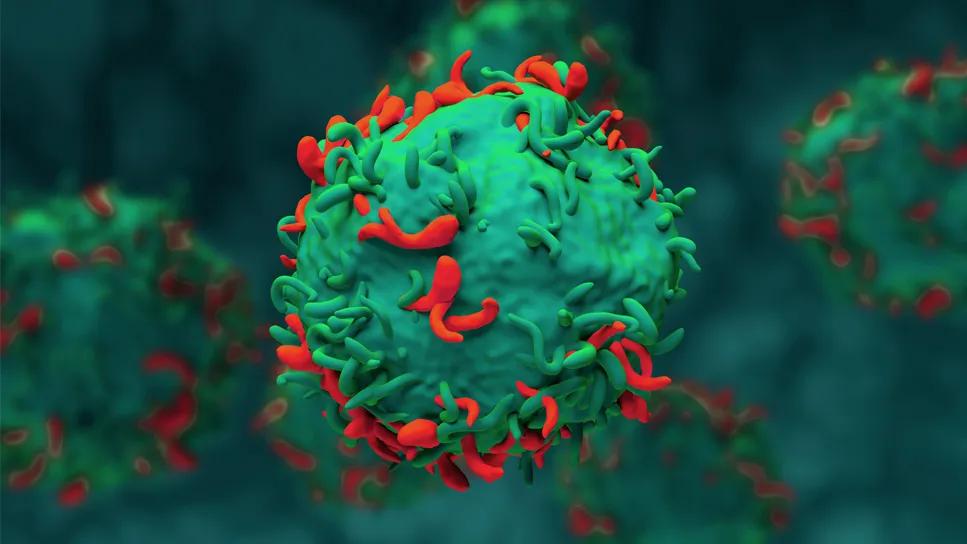Preliminary trial reports positive patient response

Preliminary data from a phase 1 trial of allogeneic chimeric antigen receptor (CAR) T-cell therapy shows therapeutic responses in relapsed/refractory multiple myeloma (RRMM) patients. The data was presented at the annual meeting of the American Society of Hematology.
Advertisement
Cleveland Clinic is a non-profit academic medical center. Advertising on our site helps support our mission. We do not endorse non-Cleveland Clinic products or services. Policy
Approved to treat some hematologic and solid cancers, CAR T-cell therapy is a type of immunotherapy in which T cells are reengineered with new cell receptors that target cell-surface proteins expressed by cancer cells, in this case B-cell maturation antigen (BCMA). “The immune cells become cancer destroying cells,” says Faiz Anwer, MD, staff in the Department of Hematology and Medical Oncology at Cleveland Clinic Cancer Center.
Allogeneic CAR T-cell therapy, which uses cells from healthy donors, has distinct advantages over autologous therapy which uses patient cells. Sick patients are spared having leukapheresis, and donor cells are healthier and can be frozen for on-demand treatment with a shorter waiting time. “Allogeneic CAR T-cell therapy saves time and has a higher chance of successful treatment using cells from donors with stronger immune systems,” says Dr. Anwer.
In the UNIVERSAL trial, a multicenter study which includes Cleveland Clinic, patients are first treated with a lymphodepleting regimen of cyclophosphamide, fludarabine and ALLO-647, an anti-CD52 monoclonal antibody. Following ALLO-647, they are treated with the CAR T-cell therapy, ALLO-715, which targets BCMA. BCMA is highly expressed on plasma and multiple myeloma cells.
The trial is testing ALLO-715 as a single infusion across four doses: 40, 160, 320, or 480 x 106 CARs. Lymphodepletion regimens consist of fludarabine (F; 30 mg/m2/day) plus cyclophosphamide (C; 300 mg/m2/day) given on three days with ALLO-647 (A; 13-30 mg x 3 days; FCA) or cyclophosphamide plus ALLO-647 (CA).
Advertisement
As of July 2020, the study had enrolled 19 patients with a median age of 65 with advanced disease who have had a median of five prior lines of therapy, including an immunomodulatory drug, a proteasome inhibitor and an anti-CD38 agent, and are refractory to their last treatment. Fifteen patients were treated with ALLO-715 at three dose levels (DL): three patients at DL1 (3 FCA and 0 CA); seven patients at DL2 (4 FCA and 3 CA); and five patients at DL3 (3 FCA and 2 CA).
The therapy generated the strongest response in patients who received ALLO-647 at 320 x106. For this cohort, the overall response rate (ORR) was 60% among 10 patients, including three of six who received CARs with low–ALLO-647 FCA and three of four who had the therapy with high–ALLO-647 FCA. Overall, six patients had a very good partial-plus response (VGPR+), a complete response or a very good partial response (VGPR). This included one patient at 160, four patients at 320, and one at 480 10 x 106 CARs. Of the VGPR+ patients, five were negative for measurable residual disease.
Additionally, six of nine patients treated at the 320 or 480 x 106 dose levels remain in response. Cleveland Clinic has one patient in the trial who has had a good response so far; patients in the trial need careful monitoring and follow up at this point.
“These results are promising. We currently don’t have good therapies for patients who have been treated with three or more prior therapies. CAR T-cell therapy could be a good option for relapsed patients who don’t have the option of waiting,” says Dr. Anwer.
Advertisement
The most common grade 3 or higher adverse events were anemia and neutropenia. Four patients had cytokine release syndrome which resolved without intervention. Overall, the regimen has a manageable safety profile.
The investigators are continuing to evaluate dosing levels for ALLO-715 and the trial is enrolling patients for the 480 x 106 cohort. It is possible that FDA approval for the first anti-myeloma CAR T-cells could come this spring. “We hope that CAR T-cell therapy will achieve quick disease control which will last for a long duration. It could become a first-line treatment someday,” says Dr. Anwer.
Advertisement
Advertisement

Radiation therapy helped shrink hand nodules and improve functionality

Standard of care is linked to better outcomes, but disease recurrence and other risk factors often drive alternative approaches

Phase 1 study demonstrates immune response in three quarters of patients with triple-negative breast cancer

Multidisciplinary teams bring pathological and clinical expertise

Genetic variants exist irrespective of family history or other contributing factors

Study shows significantly reduced risk of mortality and disease complications in patients receiving GLP-1 agonists

Structured interventions enhance sleep, safety and caregiver resiliency in high-acuity units

Addressing rare disease and challenging treatment course in an active young patient